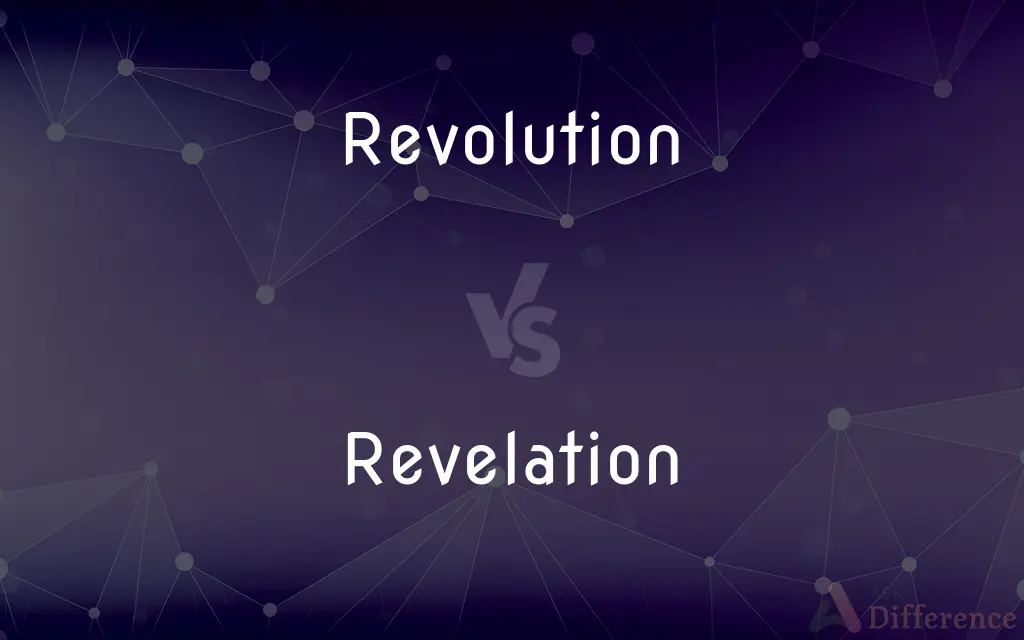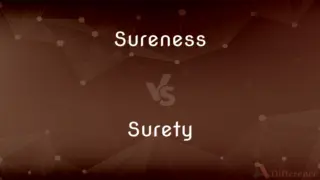Revolution vs. Revelation — What's the Difference?
By Fiza Rafique & Urooj Arif — Updated on March 21, 2024
Revolution is about radical change, often in social or political contexts, while revelation involves uncovering hidden knowledge, typically of a divine nature.

Difference Between Revolution and Revelation
Table of Contents
ADVERTISEMENT
Key Differences
Revolution often implies a significant change that upends existing structures or norms, typically in a social, political, or technological context. On the other hand, revelation pertains to the disclosure of information or knowledge that was previously hidden or unknown, often with a religious or spiritual significance.
While revolutions can be seen and experienced by many, often playing out over years or even decades, revelations are typically personal or shared within a specific community. Revolutions change societies and governments, reshaping the external world, whereas revelations change individuals and beliefs, transforming the internal landscape of understanding.
Revolutions are driven by human action and collective will, striving for tangible changes in society or governance. They involve strategies, conflicts, and often a struggle for power. In contrast, revelations are perceived as divinely inspired or as sudden insights that transcend ordinary human understanding, not requiring a collective movement but rather an individual or communal awakening.
The aftermath of a revolution can be observed in the form of new laws, social norms, or governmental structures, reflecting a concrete shift in how a society functions. Revelations, however, may not always result in visible changes in the external world but can lead to profound shifts in personal beliefs, values, and practices among those who experience or believe in them.
Comparison Chart
Nature
Sociopolitical or technological change
Uncovering of hidden or divine knowledge
ADVERTISEMENT
Process
Collective action, often involves conflict
Personal or communal, involves enlightenment
Impact
Changes in societal, governmental, or technological structures
Changes in personal beliefs, values, or understanding
Visibility
Observable by outsiders, tangible outcomes
Often internal or confined to specific communities
Source of change
Human action and will
Perceived as divine inspiration or sudden insight
Compare with Definitions
Revolution
The overthrow of a government or social order in favor of a new system.
The French Revolution began in 1789 with the storming of the Bastille.
Revelation
A surprising and previously unknown fact that has been disclosed to others.
His revelation about the company's future plans raised eyebrows.
Revolution
A drastic and far-reaching change in ways of thinking and behaving.
The digital revolution transformed how we communicate.
Revelation
An enlightening or astonishing discovery.
The scientist's revelation about the new element changed the course of her research.
Revolution
A dramatic and wide-reaching change in conditions, attitudes, or operation.
The industrial revolution drastically changed the global economy.
Revelation
The act of making something known that was previously secret or unknown.
The revelation of his true identity shocked everyone.
Revolution
A method or practice that radically changes an industry or field.
Streaming services have led a revolution in how we consume media.
Revelation
Information revealed in a surprisingly clear way.
The documentary was a revelation in understanding the civil rights movement.
Revolution
A single, complete turn (in reference to celestial bodies or machinery).
The Earth makes one revolution around the sun every year.
Revelation
The divine or supernatural disclosure to humans of something relating to human existence.
The biblical Revelation describes the end of the world.
Revolution
In political science, a revolution (Latin: revolutio, "a turn around") is a fundamental and relatively sudden change in political power and political organization which occurs when the population revolts against the government, typically due to perceived oppression (political, social, economic) or political incompetence. In book V of the Politics, the Ancient Greek philosopher Aristotle (384–322 BC) described two types of political revolution: Complete change from one constitution to another Modification of an existing constitution.Revolutions have occurred through human history and vary widely in terms of methods, duration and motivating ideology.
Revelation
In religion and theology, revelation is the revealing or disclosing of some form of truth or knowledge through communication with a deity or other supernatural entity or entities.
Revolution
Orbital motion about a point, especially as distinguished from axial rotation
The planetary revolution about the sun.
Revelation
The act of revealing or disclosing.
Revolution
A turning or rotational motion about an axis.
Revelation
Something revealed, especially a dramatic disclosure of something not previously known or realized.
Revolution
A single complete cycle of such orbital or axial motion.
Revelation
A sudden insight or idea
"I'd had the idea to dig up Dad's coffin ... I was lying in bed and I had the revelation, like a simple solution to an impossible problem" (Jonathan Safran Foer).
Revolution
The overthrow of one government and its replacement with another.
Revelation
(Theology) A manifestation of divine will or truth.
Revolution
A sudden or momentous change in a situation
The revolution in computer technology.
Revelation
Revelation See Table at Bible.
Revolution
(Geology) A time of major crustal deformation, when folds and faults are formed.
Revelation
The act of revealing or disclosing.
Revolution
A political upheaval in a government or state characterized by great change.
Revelation
Something that is revealed.
Revolution
The removal and replacement of a government, especially by sudden violent action.
Revelation
Something dramatically disclosed.
Revolution
Rotation: the turning of an object around an axis, one complete turn of an object during rotation.
Revelation
(theology) A manifestation of divine truth.
Revolution
In the case of celestial bodies, the traversal of one body along an orbit around another body.
Revelation
Something that turns out to be a great success.
Revolution
A sudden, vast change in a situation, a discipline, or the way of thinking and behaving.
Revelation
The act of revealing, disclosing, or discovering to others what was before unknown to them.
Revolution
A round of periodic changes, such as between the seasons of the year.
Revelation
That which is revealed.
Revolution
Consideration of an idea; the act of revolving something in the mind.
Revelation
The act of revealing divine truth.
By revelation he made known unto me the mystery, as I wrote afore in few words.
Revolution
The act of revolving, or turning round on an axis or a center; the motion of a body round a fixed point or line; rotation; as, the revolution of a wheel, of a top, of the earth on its axis, etc.
Revelation
Specifically, the last book of the sacred canon, containing the prophecies of St. John; the Apocalypse or Book of Revelation or The Revelation of Saint John.
Revolution
Return to a point before occupied, or to a point relatively the same; a rolling back; return; as, revolution in an ellipse or spiral.
That fearComes thundering back, with dreadful revolution,On my defenseless head.
Revelation
The speech act of making something evident
Revolution
The space measured by the regular return of a revolving body; the period made by the regular recurrence of a measure of time, or by a succession of similar events.
Revelation
An enlightening or astonishing disclosure
Revolution
The motion of any body, as a planet or satellite, in a curved line or orbit, until it returns to the same point again, or to a point relatively the same; - designated as the annual, anomalistic, nodical, sidereal, or tropical revolution, according as the point of return or completion has a fixed relation to the year, the anomaly, the nodes, the stars, or the tropics; as, the revolution of the earth about the sun; the revolution of the moon about the earth.
Revelation
Communication of knowledge to man by a divine or supernatural agency
Revolution
The motion of a point, line, or surface about a point or line as its center or axis, in such a manner that a moving point generates a curve, a moving line a surface (called a surface of revolution), and a moving surface a solid (called a solid of revolution); as, the revolution of a right-angled triangle about one of its sides generates a cone; the revolution of a semicircle about the diameter generates a sphere.
Revelation
The last book of the New Testament; contains visionary descriptions of heaven and of conflicts between good and evil and of the end of the world; attributed to Saint John the apostle
Revolution
A total or radical change; as, a revolution in one's circumstances or way of living.
The ability . . . of the great philosopher speedily produced a complete revolution throughout the department.
Revolution
A fundamental change in political organization, or in a government or constitution; the overthrow or renunciation of one government, and the substitution of another, by the governed.
The violence of revolutions is generally proportioned to the degree of the maladministration which has produced them.
Revolution
A drastic and far-reaching change in ways of thinking and behaving;
The industrial revolution was also a cultural revolution
Revolution
The overthrow of a government by those who are governed
Revolution
A single complete turn (axial or orbital);
The plane made three rotations before it crashed
The revolution of the earth about the sun takes one year
Common Curiosities
Are revelations always religious?
While many revelations have religious connotations, the term can also refer to any significant disclosure of information, especially those that bring new insights.
Can a revolution be peaceful?
Yes, revolutions can be peaceful, involving nonviolent protests and civil disobedience to achieve systemic change.
What is a revolution?
A revolution is a fundamental change in political power, societal structures, or technology that significantly alters the existing system.
What is a revelation?
A revelation is the act of revealing or disclosing something that was previously hidden, often with divine or supernatural significance.
How do revolutions impact society?
Revolutions can dramatically reshape societal, political, and economic structures, often leading to new forms of governance and societal norms.
Is a revelation always a positive experience?
Revelations can be positive or unsettling, depending on the nature of the disclosed information and its impact on individuals or communities.
Can technology cause revolutions?
Yes, technological advancements can lead to revolutions, such as the industrial revolution and the information technology revolution.
What is the difference between a revolution and a rebellion?
A rebellion is an act of violent or nonviolent resistance against an established government or authority, while a revolution seeks to completely overthrow and replace the existing system.
How do revelations affect individuals?
Revelations can profoundly impact an individual’s beliefs, values, and understanding of the world, often leading to significant personal transformation.
Can revelations lead to conflict?
Yes, revelations, especially those with significant implications or that challenge established beliefs, can lead to conflict within societies or groups.
What are examples of revolutions?
Examples include the American Revolution, the French Revolution, and the digital revolution.
Are all revolutions violent?
Not all revolutions are violent; many involve peaceful protests, civil disobedience, and other nonviolent means to achieve change.
Can anyone experience a revelation?
Yes, revelations can be experienced by anyone, though the context and significance may vary widely between individuals.
What role does revelation play in religion?
In religion, revelation is crucial as it involves divine truth being disclosed to humans, often forming the foundation of religious beliefs and practices.
How do societies prepare for revolutions?
Societies may prepare for revolutions through activism, building coalitions, and raising awareness about the need for change.
Share Your Discovery

Previous Comparison
Immature vs. Immatured
Next Comparison
Sureness vs. SuretyAuthor Spotlight
Written by
Fiza RafiqueFiza Rafique is a skilled content writer at AskDifference.com, where she meticulously refines and enhances written pieces. Drawing from her vast editorial expertise, Fiza ensures clarity, accuracy, and precision in every article. Passionate about language, she continually seeks to elevate the quality of content for readers worldwide.
Co-written by
Urooj ArifUrooj is a skilled content writer at Ask Difference, known for her exceptional ability to simplify complex topics into engaging and informative content. With a passion for research and a flair for clear, concise writing, she consistently delivers articles that resonate with our diverse audience.
















































